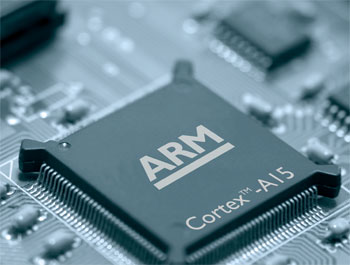

British chip designer ARM Holdings has dashed UK hopes of a dual public listing in both London and New York, despite the highest level political interventions.
Three British Prime Ministers have lobbied hard to encourage a London listing – the latest being Prime Minister Rishi Sunak who in January held a meeting with ARM CEO Rene Haas and SoftBank’s founder and chief executive Masayoshi Son, in a last ditch attempt to convince ARM and SoftBank to apply for a public listing in London.
But British hopes of a dual listing in both New York and London seemed a tall order, as SoftBank has repeatedly made clear its intention for a US listing. However London was hoping to convince SoftBank senior management to also list on the London Stock Exchange.
But now in a statement last Friday Rene Haas has dashed those hopes, but left the door open when he hinted a subsequent UK listing may be a possibility.
“After engagement with the British government and the Financial Conduct Authority over several months, SoftBank and ARM have determined that pursuing a US-only listing of ARM in 2023 is the best path forward for the company and its stakeholders,” said Haas in a statement last week.
ARM however pledged to keep its headquarters, operations and “material intellectual property” in the UK, and also said it intends to expand its presence with a new site in Bristol and “continued headcount”.
“ARM is proud of its British heritage, and continues to work with the British government,” the company reportedly said. “We will continue to invest and play a significant role in the British tech ecosystem.”
Haas added the company will consider a UK listing “in due course”.
ARM is likely to aim to raise at least $8 billion from what is expected to be a blockbuster US stock market launch this year, people familiar with the matter told Reuters on Sunday.
ARM is expected to confidentially submit paperwork for its initial public offering in late April, the sources told Reuters, speaking on condition of anonymity because the discussions are confidential.
The listing is expected to happen later this year and the exact timing will be determined by market conditions, the sources added.
The preparations for the IPO are expected to be kick-started in the US in the coming days, the sources said.
The valuation range has not yet been finalised but Cambridge-based ARM is hoping to be valued at more than $50 billion during its share sale, the sources said.
The decision to seek an IPO came after ARM’s $40bn sale to GPU powerhouse Nvidia was called off in February 2022, due to “significant regulatory challenges”.
The UK government had led that global challenge to the deal, and indicated it would block it on national security grounds.
Soon after the Nvidia deal fell through, Masayoshi Son in February 2022 indicated that the US Nasdaq would be the most likely listing destination for ARM.
The head of Japan’s SoftBank then reiterated this stance in June 2022.
Meanwhile the Financial Times reported that the UK’s Financial Conduct Authority (FCA) has been blamed by some UK officials and SoftBank staff for London losing out to New York on the listing of ARM.
Onerous FCA rules concerning the reporting of “related party transactions” were a crucial reason behind ARM’s decision, according to two people briefed on it, speaking to the FT.
The complexity and cost of the process were also contributing factors.
According to the Financial Times, one senior government insider said the FCA was encouraged to be flexible in its approach, but without success: “They were asked to think big but they thought small.”
Another person with knowledge of SoftBank’s decision added that the political chaos in the UK over the past year also weighed on the process.
“Regulations played a key part,” they reportedly said. “The lack of a semiconductor strategy hasn’t helped. The political upheaval came at the wrong time. They did a side by side, cost benefit analysis . . . ARM would have to do a lot more stuff to list in the UK than the US.”
ARM was formed in 1990 when it was spun out of Acorn Computers, and its chip designs are used in 95 percent of smartphones due to their low power consumption.
This makes ARM a major force in the semiconductor market, and it licensing its designs to some of the world’s largest consumer tech manufacturers including Qualcomm and Apple.
Japan’s SoftBank had acquired ARM for $32bn in 2016.
Before that, ARM was actually dual-listed in London and New York until the 2016 SoftBank acquisition – an acquisition the UK government at the time welcomed, despite concern at ARM falling into the hands of a foreign entity.
British retailer Marks & Spencer apologises after it struggles to recover from cyberattack this week,…
Apple to pivot manufacturing of iPhones for US away from China and to India, after…
Boom time. Amid ongoing cost cutting and potential break-up threat, Alphabet profits surge as AI…
AI pioneer OpenAI is interested if Google is forced to sell of its Chrome browser…
Several units within Google notified remote workers jobs will be in jeopardy if they don't…
Leading holders of Trump meme coin receive invitation to private gala dinner with US President,…